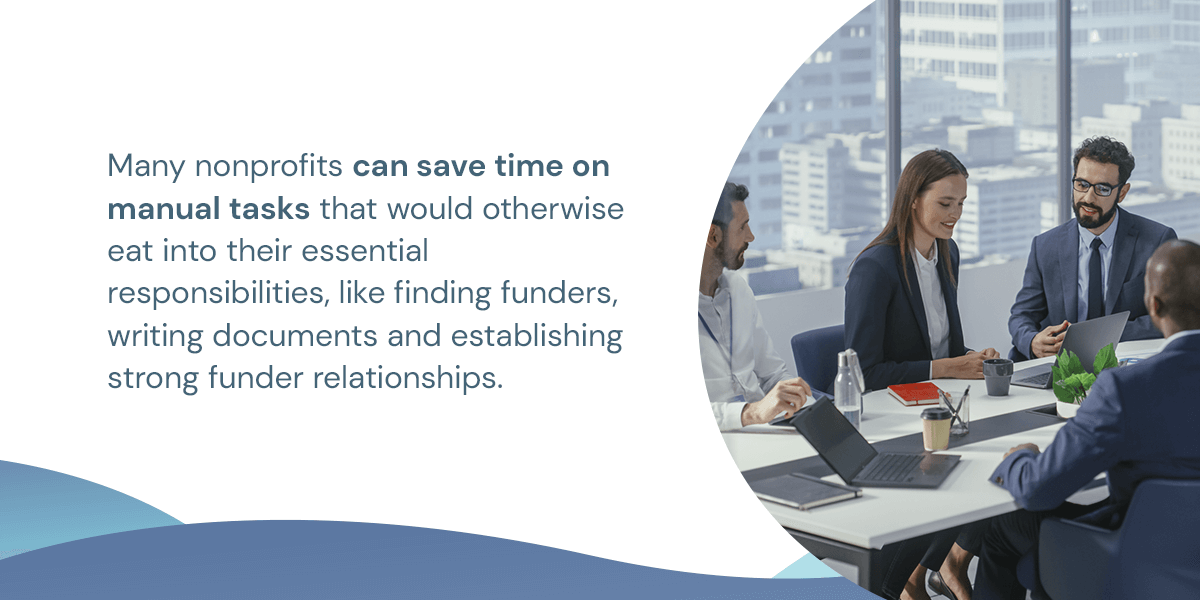

Jump to Content
If you are a nonprofit company looking to manage your grant applications and submissions, you may want to consider grant management software. Staying organized with grant management means you’ll have more time to focus on essential tasks and funder relationships.
The grant management process organizes programs and services in the grant application and submission process. Understanding how grant applications work is critical to the success of your submissions and funder relationships. While being awarded new funds is essential to your organization’s success, it is just a tiny part of the process. From writing the document to submitting your application and reporting on your results, you’ll want to become familiar with every aspect of managing your grants, and organized management can help.
A well-developed grant management system helps you stay on track and meet critical deadlines. Here are seven organizing grant management tips to help you achieve your funding goals.
You can share clear goals and a well-developed plan with the entire team to ensure everyone is on the same page during the process. Your first action should be to prepare for the pre-award stage.
Some pre-award actions include the following:
One of the best ways to help you keep track of your grants is to use a grant calendar or tracking list. A calendar enables you to keep track of important dates, report submission reminders, and proposal deadlines that every employee at your nonprofit should keep in mind. Some tracking lists or calendar applications include:
No matter what kind of tracking list you use, you’ll want to be sure that it meets specific criteria. Ensure that everyone involved in the grant process can see essential deadlines and get reminded of important deadlines through email or calendars. You should be able to add new tasks or deadlines to the calendar. The grant management system should allow users to focus on funder relationships without worrying about manual tasks.
Another important step is to organize your funder and grant history. Try your best to document important information to prevent missing dates, running behind schedule, or other mishaps.
When tracking critical information about funders and grants, many people keep information within email folders or online documents. However you choose to organize information, try your best to write it down or type it out, as keeping it all in your head could be risky for your nonprofit.
When it comes to funders, some essential information to track includes:
You’ll also want to keep track of your overall grant history. Try to ensure that your workers can access past, present, and future requests whenever they need to make the process efficient. Some grant history information to track includes:

Grant management can also help you coordinate your team and ensure you stay on the same page throughout the process. Many enjoy that an organized process helps team members stay on schedule during hectic days or deadline-specific tasks.
For team members wondering how to manage grants using grant management software, point them toward highlighted tasks. Coordinated teams use grant software to remind others of upcoming due dates, view future schedules, track deadlines and send email reminders. Many nonprofits can save time on manual tasks that would otherwise eat into their essential responsibilities, like finding funders, writing documents and establishing strong funder relationships.
Many funders have specific rules and regulations for application submission and grant writing. To ensure that you understand and follow these rules, try to become familiar with the changes or requirements of each type of funder.
Suppose your company plans to apply for a government grant. Many of these regulations lie in the U.S. Office of Management and Budget Circular. Usually, you can find these rules in a management document or grant booklet from their office, or you can find circulars online.
Even if you aren’t applying for a government grant, always ask for their booklet or catalog or rules and regulations to be sure you are taking the proper steps. Ask for extra information or call to speak to a representative. When in doubt, you could even hire a consultant or set up a software system to manage your grants and be sure you follow every rule they require.
Much of the grant process stays the same regardless of the funder you apply to. Preparing documents before your application allows you to streamline the grant management process. When you need to apply for grants, you will have most of the work done. As a result, you can spend less time on low-value tasks like gathering information and more time on tasks that make your organization stand out.
Create a library to gather important grant documents, templates, and boilerplates. This library may also include common grant questions and answers so that you know where to go when you get stuck during development. Make these files accessible to everyone on your team who needs them, possibly through online file sharing. When you need to access current information, you can find it easily in one convenient place.
The grant management process continues after you successfully submit applications and supporting documentation. Your method should include compiling reports that demonstrate your current progress in grant-seeking.
These reports give your organization and board a concrete source of data. When people ask about your progress, you can quickly refer them to the latest information rather than spend hours compiling a report. These reports can include information like planned, in-progress, pending, awarded, and denied grants. You might also track metrics like grant win percentage or top funders for particular programs.
When managing your grant applications, implementing grant management software or other helpful tools can be essential to making your nonprofit thrive. Software can help track your grants, set up tasks, and follow each step through to submission. Using these tools ensures that your members have more time to find new funders and invest in building relationships rather than looking at spreadsheets and online reports.
IGX Solutions offers some of the best tools to meet your organization’s pre-award, award, and post-award grant management software needs. Our software helps you save time and money by automating workflow and improving your current process so that the integration is seamless. Using IntelliGrants® IGX, Core CVC™ or BEPro™, we help take control of your data by centralizing information in one reliable source. Whether you need to track expenses, review working applications, customize reports or work across different devices, IGX Solutions is here to adapt to your nonprofit’s design.
Grant management software provides a comprehensive solution for staying organized with grant management. While you may have several options for grant management software, consider using IntelliGrants IGX for these top features:

These tips can ensure that you manage your grants well and streamline the application process. From organizing your funding information to installing a reliable grant management platform, taking control of your procedures can help you find better funding and improve your nonprofit over time.
At IGX Solutions, we pride ourselves in offering clients premier grants management systems for your grant writing and applications. With over 120 satisfied clients in 34 states, our company consistently retains new customers by providing grant software that solves your workflow needs. Our team members will help guide you through the process, suggesting applications and design improvements along the way. Book a demo today or call us to speak to a representative.